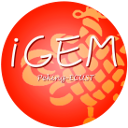Team:Peking/DataPage/Judging
From 2012.igem.org
Spring zhq (Talk | contribs) |
Spring zhq (Talk | contribs) |
||
| Line 15: | Line 15: | ||
3. presented all fresh iGEMers with a collection and praise of historic iGEM projects to share and learn from each other! Click <a href="https://2012.igem.org/Team:Peking/HumanPractice/Review">Here</a>.<br /><br /> | 3. presented all fresh iGEMers with a collection and praise of historic iGEM projects to share and learn from each other! Click <a href="https://2012.igem.org/Team:Peking/HumanPractice/Review">Here</a>.<br /><br /> | ||
4. submitted 11 high quality and well-characterized standard biobricks! Click <a href="https://2012.igem.org/Team:Peking/DataPage">Here</a>.<br /><br /> | 4. submitted 11 high quality and well-characterized standard biobricks! Click <a href="https://2012.igem.org/Team:Peking/DataPage">Here</a>.<br /><br /> | ||
| - | 5. improved the ease-of-use of "Lux Brick" that primarily constructed by Cambridge iGEM 2010 and carefully characterized its dynamics of functionality! Click <a href="https://2012.igem.org/Team:Peking/ | + | 5. improved the ease-of-use of "Lux Brick" that primarily constructed by Cambridge iGEM 2010 and carefully characterized its dynamics of functionality! Click <a href="https://2012.igem.org/Team:Peking/DataPage">Here</a>.<br /><br /> |
| - | 6. rationally constructed an ultra-sensitive genetically encoded sensor of luminance – what we call the <i>Luminesensor</i> and comprehensively characterized it. <i>Luminesensor</i> proved to be as sensitive to sense natural light and even bioluminescence!<br /><br /> | + | 6. rationally constructed an ultra-sensitive genetically encoded sensor of luminance – what we call the <i>Luminesensor</i> and comprehensively characterized it. <i>Luminesensor</i> proved to be as sensitive to sense natural light and even bioluminescence! Click <a href="https://2012.igem.org/Team:Peking/Project/Luminesensor">Here</a>.<br /><br /> |
7. successfully implemented spatiotemporal control of cellular behavior, such as high-resolution 2-D and 3-D bio-printing using dim light, and even utilizing the luminescence of an iPad! <br /><br /> | 7. successfully implemented spatiotemporal control of cellular behavior, such as high-resolution 2-D and 3-D bio-printing using dim light, and even utilizing the luminescence of an iPad! <br /><br /> | ||
8. successfully implemented cell-cell communication using light for the very first time in synthetic biology!<br /><br /> | 8. successfully implemented cell-cell communication using light for the very first time in synthetic biology!<br /><br /> | ||
Revision as of 13:37, 21 September 2012
Achievements
This summer, we have
1. collaborated with a lab and helped 4 other iGEM teams by sharing DNA materials, characterizing their parts and modeling! Click Here.
2. outlined and detailed a new approach of human pratice called "Sowing Tomorrow Synthetic Biologists"! Click Here.
3. presented all fresh iGEMers with a collection and praise of historic iGEM projects to share and learn from each other! Click Here.
4. submitted 11 high quality and well-characterized standard biobricks! Click Here.
5. improved the ease-of-use of "Lux Brick" that primarily constructed by Cambridge iGEM 2010 and carefully characterized its dynamics of functionality! Click Here.
6. rationally constructed an ultra-sensitive genetically encoded sensor of luminance – what we call the Luminesensor and comprehensively characterized it. Luminesensor proved to be as sensitive to sense natural light and even bioluminescence! Click Here.
7. successfully implemented spatiotemporal control of cellular behavior, such as high-resolution 2-D and 3-D bio-printing using dim light, and even utilizing the luminescence of an iPad!
8. successfully implemented cell-cell communication using light for the very first time in synthetic biology!
Therefore, we believe that we deserve a Gold Medal Prize.
 "
"














